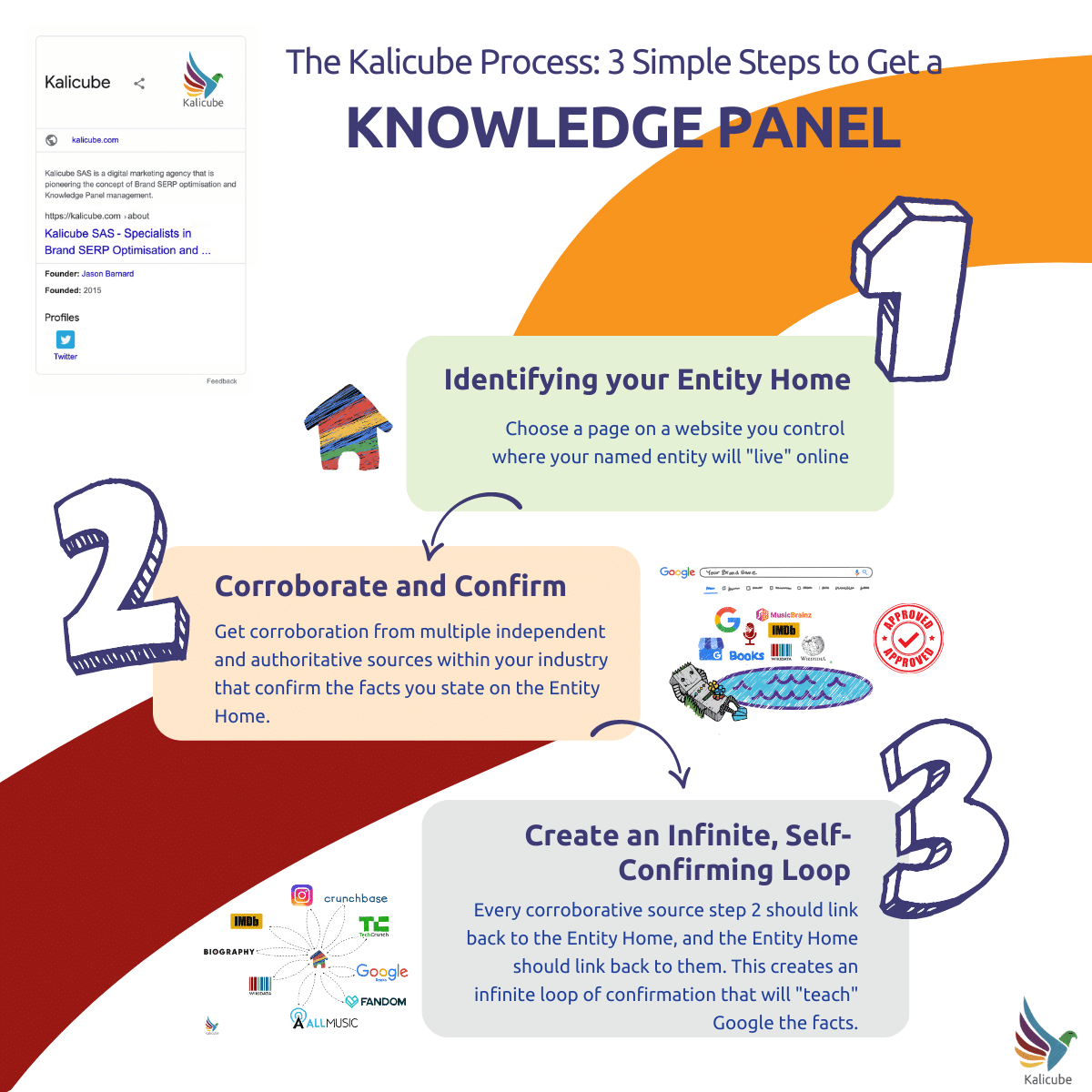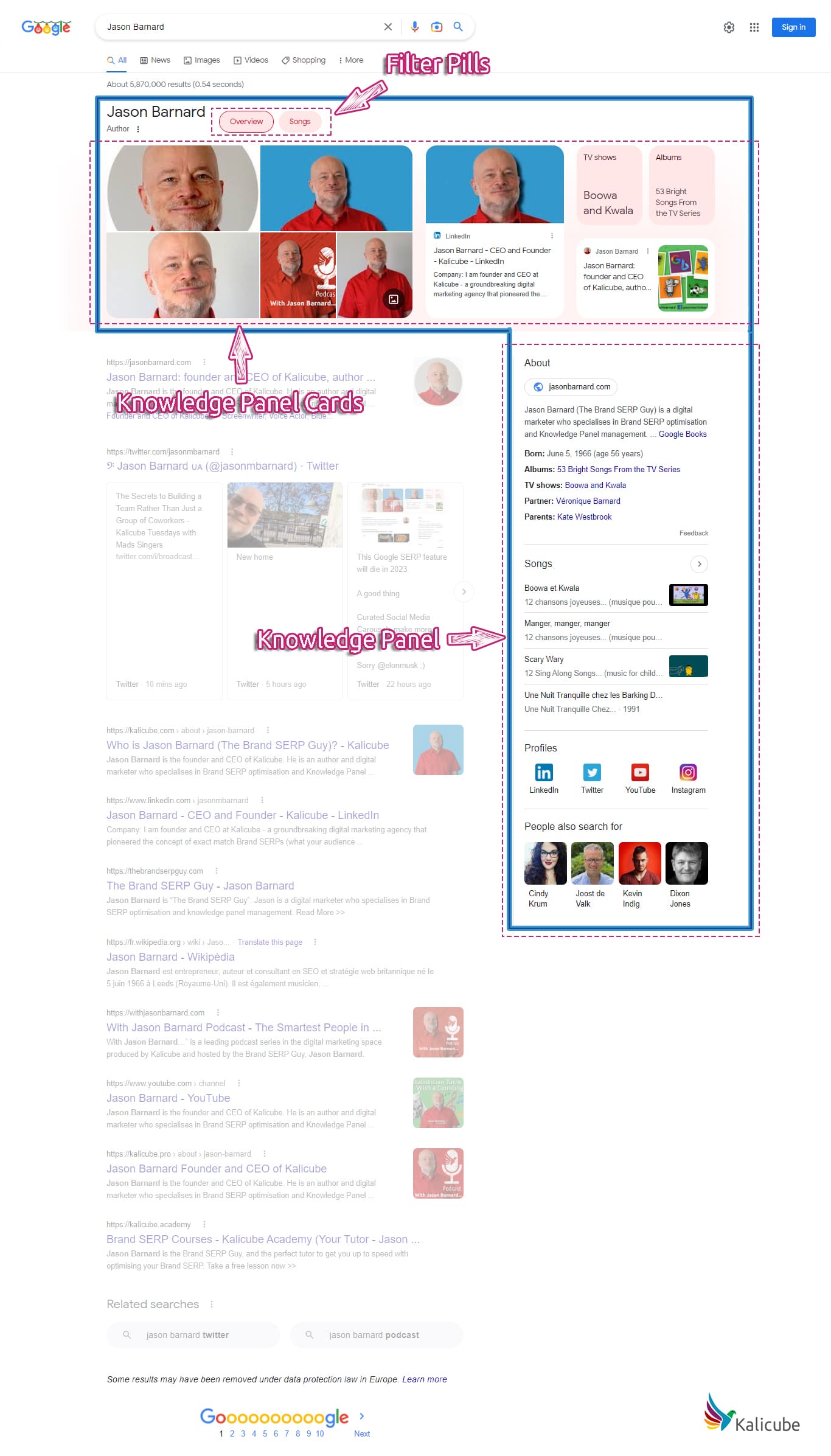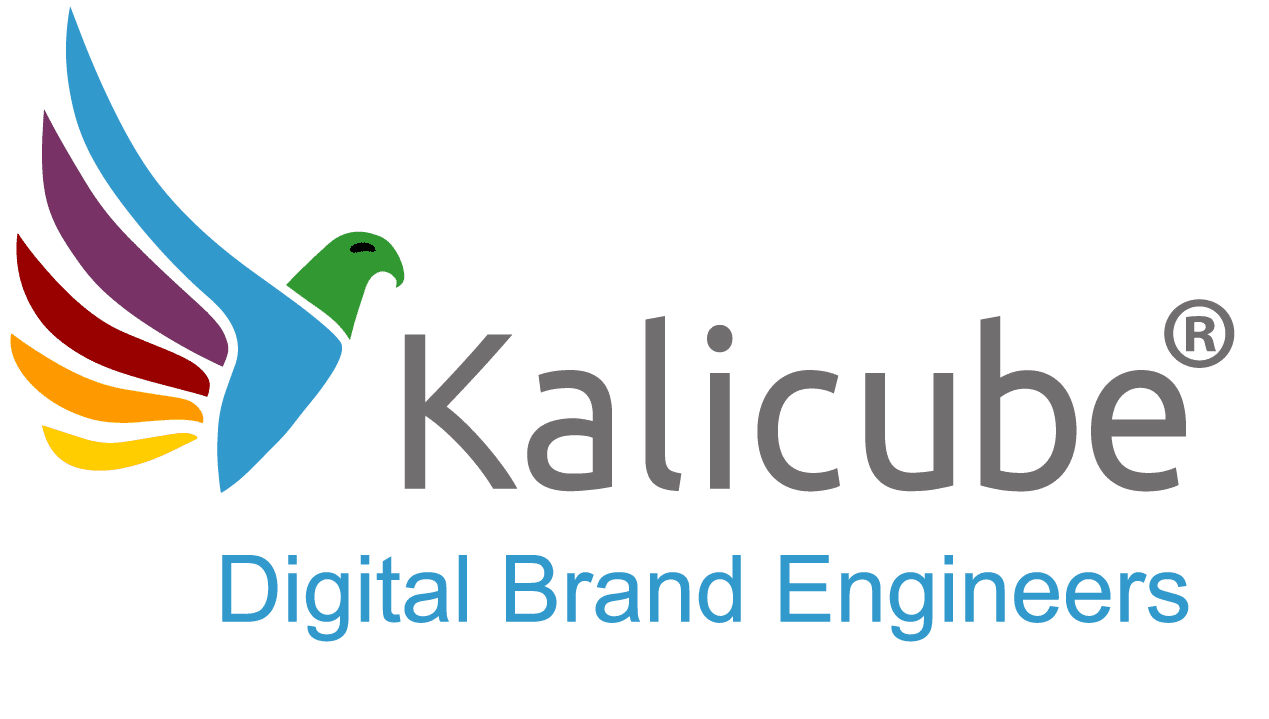Why Google Knowledge Panels Disappear and How to Get Yours Back

Can a Knowledge Panel Disappear?
Yes. Most people believe that after successfully obtaining a Knowledge Panel, it will be there forever. It is tempting to believe that everything will happen by itself without you having to do anything. There is no such magic spell. The only guaranteed way to make sure that your Google Knowledge Panel never disappears is to work on it over time.
All Knowledge Panels are a constant work in progress since information about the entity changes, Google’s algorithms evolve, and new features are constantly added to Google’s Knowledge Panels.
For a Knowledge Panel to become a stable and permanent fixture on your Brand SERP, Google needs to be SUPER confident in the veracity of the information. Building up that confidence is necessarily a long-term project.
At Kalicube, we have triggered thousands of Knowledge Panels, recovered lost ones, and know the best way to handle them.
Why Did My Knowledge Panel Disappear?
Knowledge Panels disappear because entities (people, music group, podcast, company, author, etc.) have not firmly established their place in the Google Knowledge Vault. This means that you need to establish the Entity Home to provide an authoritative reference point and baseline version of facts about your entity, and ensure that relevant, authoritative sources confirm the facts you provide to Google in your Entity Home.
Over the 10 years we have been working on Knowledge Panels at Kalicube, we have found that the Entity Home is the single most important part of Knowledge Panel Management.
Google Is Confused or No Longer Confident About You
A Knowledge Panel is algorithmic. Google algorithmically generates Knowledge Panels based on its understanding of the information available on the Web. Google’s algorithms use a variety of signals to decide whether to display a Knowledge Panel, including the relevance and quality of the available information on a particular topic or entity.
When you initially create a Knowledge Panel, Google’s trust in an entity and confidence in the information will be very, very low. As the owner of this entity, it is your job to increase Google’s trust and confidence.
If Google deletes your Knowledge Panel, it means two things:
- It lacks confidence in the information about entity, or
- It doesn’t trust the information it receives from that entity, or
- It is confused by conflicting information about the entity it finds around the web.
What You Can do to Protect Your Knowledge Panel
So if you are a brand owner with many corroborating sources from various authoritative sites (your own site, Facebook, Twitter, Linkedin, etc.), you need to make sure that all the information in those accounts is completely consistent with each other. You do not want your LinkedIn account to contradict what Google knows about your brand from the other sites such as Twitter or Facebook.
Over time (a year or two), this consistency builds confidence and trust and that will solidly fix that entity’s place in the Knowledge Vault.
Getting an article on Wikipedia is the most common first idea to seed up the process and establish a place in the Knowledge Vault for an entity. This technique works, and is hugely helpful for notable entities. However, it is dangerous for two reasons: firstly, handing control of your entity to faceless Wikipedia editors is not ideal, and secondly, if that article is deleted, your Knowledge Panel will disappear… setting you back several years.
Warning: If you fail to establish your entity’s place in the Main Knowledge Vault because of confusing information, Google may simply delete the Knowledge Panel.
Volatile Days: The Knowledge Vault Update
When Google’s Knowledge Vault updates, there can be several impacts on search results and information displayed in Knowledge Panels. While little is known about the dynamics behind this activity, what is certain is that existing Knowledge Panels are often affected by the algorithmic update.
These days are typically days when many Knowledge Panels disappear, but also days when many Knowledge Panels are created.
Kalicube Pro™ (Kalicube’s proprietary SaaS platform) tracks and measures Knowledge Vault Updates using multiple metrics (one is shown below).
With data sourced from Google dating from 2015 (and growing), Kalicube Pro™ has over 3 billion data points and tracks over 100,000 entities and dozens of countries. Kalicube Pro knows which sources Google trusts to corroborate business information online -and there are over 40,000.
Apart from Google, Kalicube Pro is the only tool that can tell businesses and agencies what has happened in the Knowledge Vault, what changes the algorithms are making, and the changes in strategy required to protect, stabilize and enrich Knowledge Panels.
Kalicube Pro empowers business leaders and agency owners to future-proof their digital brand strategy because when Google knows, likes and trusts you, it prioritizes you in the search results.

Since Google’s Knowledge Vault depends on consistent information about the entity across the web, if your entity does not have consistent and sufficient corroboration, it has a significantly higher risk of disappearing. Therefore, you need to ensure that relevant, authoritative sources consistently confirm the facts you provide to Google on your Entity Home.
Pro Tip: Kalicube is not afraid of the Knowledge Algorithm updates, on the contrary, we look forward to them. Kalicube Pro™ has been tracking Google’s Knowledge Vault through Knowledge Panels and Application Programming Interfaces (API) for several years. You can check updates on Kalicube®’s Knowledge Vault Sensor or use this free tool to get results from Google’s Knowledge Vault API.
Read this article that goes into detail about Google Knowledge Vault algorithm updates and volatility.
Knowledge Panel Spam
Knowledge Panel Spam exists!
Knowledge Panel Spam is a practice whereby people trigger and manage Knowledge Panels using techniques that do not comply with Google’s guidelines. The definition of Knowledge Spam (that triggers these Spam Knowledge Panels) is content designed to trick the Knowledge Algorithms and that is not helpful to people.
If you have tricked Google to give you a Knowledge Panel by spamming, there is good chance that your Knowledge Panel will be deleted either during Knowledge Algorithm updates or by a person at Google.

If the Knowledge Panel is deleted because you spammed the system, expect a bigger task rebuilding than it was to build in the first place. The reason? Google and its algorithms will associate you with fraud and will have less confidence in the information you share.
At Kalicube, we have a reliable experience in improving or rebuilding Knowledge Panels. The Kalicube Process™ is designed to build solid, reliable and information-rich Knowledge Panels for any Entity.
Approximate Timelines:
- Spam Knowledge Panel: 2 weeks to a month. Problem: often deleted within a year, then back to significantly-worse-than-suqare-one/;
- Spam-free Knowledge Panel takes about 3 months to trigger;
- Spam-free “Knowledge Panel for life” takes about a year to become solid, reliable and information-rich.
How do I get back my Knowledge Panel?
Build Google’s understanding and verify your identity
You don’t need to be notable or popular to get back your Knowledge Panel. You just have to make sure that Google understands who you are and what you do. Then have that information verified and reinforced by a variety of trusted and authoritative online sources. When you provide facts that help build Google’s understanding of your Entity, you’ll get your Knowledge Panel back.
You also need to verify your identity again. You can do this either by claiming a Google My Business profile or linking your social media accounts to Google. Once done, Google can easily understand who you are, what you offer and who your audience is.
Submit feedback to Google
You can provide feedback to Google by going to the Google Knowledge Panel page and entering the needed information when you click the “suggest edits” button. Google will then review your feedback and take appropriate action. However, it may take some time for Google to review your feedback and restore your Knowledge Panel.

Establish Authority and Relevance
Continue to build your online presence by creating quality content, participating in online forums, and networking with other professionals in your field. You need to make sure your information is accurate, up-to-date, and consistent across all platforms. Corroboration is important so that the machine will not get confused about the information on your Entity.
Optimise Website and Structured Data
Ensure that your website is well-optimised for search engines. You can implement structured data markup, such as Schema.org, to provide Google with additional information about your Entity. This can improve your chances of getting your Knowledge Panel back.

Monitor and Improve your online presence
Continually monitor your online presence and engage with your audience. Encourage positive reviews and testimonials from satisfied clients or customers. Respond promptly to enquiries and feedback. Building a positive online reputation can influence the likelihood that you will receive a Knowledge Panel.
If you have followed all these steps and your Knowledge Panel has not recovered, you can ask Google Support for help.
How Can I Make Sure That My Knowledge Panel Does Not Disappear?
To ensure that your Knowledge Panel does not disappear, you need to build a solid and stable Knowledge Panel. With Kalicube’s system for Entity Home and corroboration, you can maintain that consistency, which will build Google’s confidence over time.

Data from the Kalicube Pro platform shows that it takes two years to build Google’s confidence so that your Knowledge Panel is secure and does not disappear on an “algorithmic whim”.
So the simple trick is to give Google relevant, authoritative and trusted signals about your entity. Consistency is the key! The more often Google sees the same information on authoritative sources it trusts, the more confidence it has in the accuracy of the information, and the more stable the Knowledge Panel.
If you need help maintaining consistency over time that ensures your Knowledge Panel remains stable long term, Kalicube offers a Knowledge Panel done with you service.
Here are some tips on how to ensure that your Knowledge Panel will not disappear again:
Continue to build your online presence
The more visible you are online, the more likely Google is to retain your Knowledge Panel. This means that you should create quality content that is well-written within your niche or industry, participate in online forums to connect with other people in your industry and solicit positive reviews and testimonials from satisfied customers to increase your credibility.
Keep your information up-to-date
Make sure the information in your Knowledge Panel is accurate and up-to-date. Important information includes your Entity home, Entity’s name, contact information, and social media accounts that are linked to your Entity.
Follow Google’s Guidelines
Google has smart algorithms that will know if you are tricking it such as Knowledge Panel Spam, a practice whereby people trigger and manage Knowledge Panels using techniques that do not comply with Google’s guidelines.
If the Knowledge Panel is deleted because you spammed the system, rebuilding the Knowledge Panel will be harder because Google and its algorithms will associate you with fraud. A Knowledge Panel can be deleted by either the algorithm or a person at Google. Either way, expect a bigger task rebuilding than it was to build in the first place.
So what to do? Adhere to Google’s Knowledge Panel guidelines. By following these guidelines, you can ensure that your Entity meets the criteria required to have a Knowledge Panel.
Be patient
It can take some time for Google to update its Knowledge Vault. If your Knowledge Panel disappears, don’t panic. Just continue to build your online presence and Google will eventually update your Knowledge Panel.
By following these tips, you can help to ensure that your Knowledge Panel will not disappear again.
How Long do You Need to Actively Manage Your Knowledge Panel?
Once you have triggered your Knowledge Panel, we strongly advise you to actively manage it so that it becomes stable and dominant. A year or two is enough to create a stable and dominant Knowledge Panel. Beyond that initial period, we suggest continuing since the digital ecosystem of the entity will evolve over time, Google’s algorithms will change and Google will add additional features to Knowledge Panels. Ideally, you want to be ready for all three!
Getting a Magnificent Knowledge Panel Will Take Time, But is Attainable for Anyone
My own Knowledge Panel is information-rich and impressive today. Why? Because I have worked on it consistently, paid attention to details, and proactively managed it for 10 years now.
Pro Tip:
Monthly: I do a “digital footprint” spring-clean. This takes an hour or two using Kalicube Pro.
Weekly: I correct inaccurate information as soon as it appears on the web.
Daily: I track my Knowledge Panel and Brand SERP daily in 10 locations (using Kalicube Pro).
Tracking is HUGE. I get alerts when something is changed, added or removed in my Knowledge Panel, meaning I can take action if necessary.
Kalicube Pro tracking also automatically finds new content about me online (think “super effective mention tracker”). When somethig new appears, I check it for accuracy and correct any inconsistencies as soon as they appear on the web. This keeps things ULTRA clear for Google’s Knowledge Algorithms which builds their confidence day after day.
Having access to historical data also means I can backtrack, find the key moments and figure out WHY things changes, which makes it super-easy to improve, correct and maintain the information in my Knowledge Panel and ensure it represents me factually to my audience.

Maintaining a Knowledge Panel Allows you to Take Advantage of New features
Knowledge Panel Cards appeared in 2022 and are now widespread. As you can see in the image above, Knowledge Panel Cards cover about 25% of the space above the fold. In this situation, the Knowledge Panel covers a massive 70% of the space above the fold. Knowledge Panel Cards are an important development in Google Knowledge Panels since they cover a large amount of SERP Real Estate and the Knowledge Panel dominates the Brand SERP (the Google result for your name).
Filter Pills started appearing in 2020. Filter Pills are also an important part of a Knowledge Panel since they highlight different aspects (or facets) of the entity. When the user clicks on a Filter Pill, they see a result about the entity that focusses on that aspect of them such as movies, TV shows, or music.
Both new features, Filter Pills and Knowledge Cards, appeared on my Knowledge Panel as soon as Google released them. So I got them both at the same time as famous people such as Bill Gates.
I am not famous like Bill, and there is significantly less information online about me. Why did I get the Filter Pills at the same time as famous people? Because my Knowledge Panel is strong, stable and my digital ecosystem is clean and easy to digest for Google’s Knowledge Algorithms.
Pro Tip:
Kalicube (or a Kalicube Certified Agency™) have the tools, the experience and the resources to create a stunning Knowledge Panel for you in just a few months and manage this over time so you benefit from a stable and dominant Knowledge Panel.
How Does a Stable Knowledge Panel Fit Into Brand SERP Optimisation and Knowledge Panel Management?
Knowledge Panels are clearly an incredibly important component of Brand SERP Optimisation.
In the new epoch of Entity SEO and brand-focussed digital marketing, having a Knowledge Panel on your Brand SERP is no longer a “nice to have”, it is a “must-have”.
You can well imagine that if the Knowledge Panel is deleted because Google no longer knows or trusts you, or because you spammed the system, you have lost a HUGE benefit.
And you now know that rebuilding a Knowledge Panel that disappeared (for whatever reason) is significantly more difficult because Google and its algorithms will have lost trust and confidence in you and your entity.
Since Google is a knowledge-based, entity-based search engine, trust is the cornerstone. You need to convince Google to trust you, and the best way to do that is with faultless Knowledge Panel Management over time. An information rich Knowledge Panel with Knowledge Panel Cards, Filter Pills, multiple attributes, visuals and People Also Search For is a sign that you are doing a great job.
At Kalicube, we understand that your brand is not what you say it is,
but what Google says it is. That’s why we developed the Kalicube® Process to manage Google’s representation of your brand to your audience, including a solid, reliable and information-rich Knowledge Panel.
More Information About Google Knowledge Panels
- What information does Google include in a Knowledge Panel >>
- Why Do You Need to Manage Your Knowledge Panel Over Several Years?
- Finding a Google Knowledge Panel: What You Need to Know
- The Anatomy of a Knowledge Panel (Knowledge Panel Template) - What You Need to Know
Contributor

Jean Marie
Website Content Manager. Joined Kalicube in February 2022
LinkedIn: www.linkedin.com/in/jeanmarielaurente
Email: [email protected]



